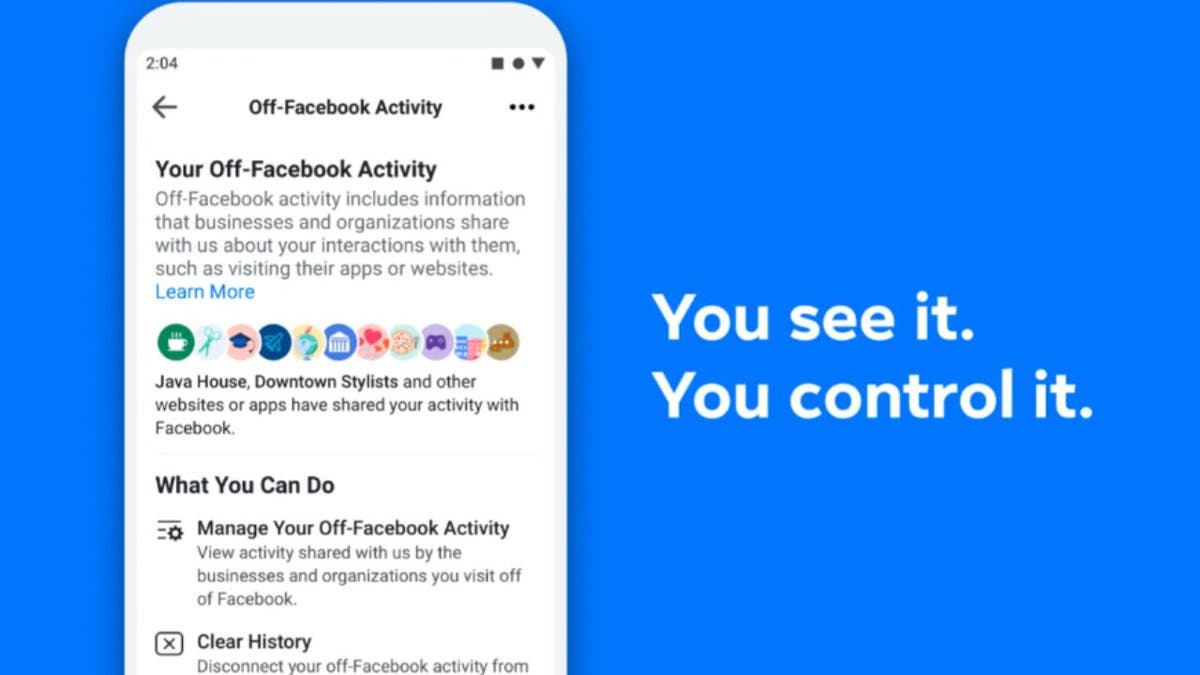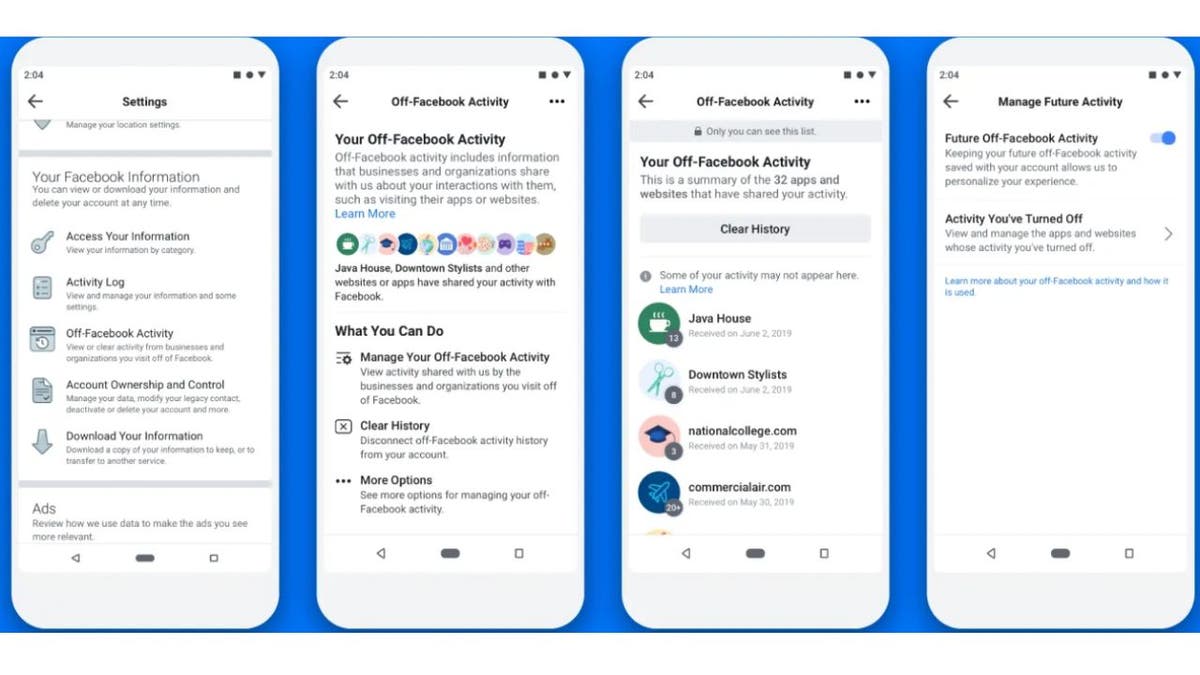Do you ever feel like your Facebook is listening to you, or watching your every move? That whenever you search for something on another website or have a conversation with a friend, the next minute you’re seeing ads on Facebook for that same thing?
This is no coincidence. Although Facebook has denied that our phones listen to us, they do have other ways of finding out what we are talking about, listening to and searching for. In some cases, it seems like they know what we’re thinking, too.
If you’re feeling a bit creeped out by all this, we don’t blame you. The good news is that while Facebook does have many capabilities, it isn’t omnipresent.
The good news is that there are ways to escape Facebook’s creepy ad tracking, so you can scroll in peace.
SCAMMERS ARE USING FAKE NEWS, MALICIOUS LINKS TO TARGET YOU IN AN EMOTIONAL FACEBOOK PHISHING TRAP

There are ways to escape Facebook’s creepy ad tracking. (Kurt “CyberGuy” Knutsson)
Does Facebook know what I’m searching on Google?
If you’re wondering whether Facebook can track what you search for on Google, the answer is no. (Though it sure does feel like it, right?)
Though Facebook isn’t able to track what you’re searching for in Google, Facebook does use tracking cookies that are stored on your computer or mobile device to “get to know you” better. These cookies are logged information about your online activity, which they can get while the Facebook app is on your phone, and you’re running other apps in the background. They’re also able to collect your data from third parties to understand your behavior based on which sites or apps you visit, or what you like on Facebook.
The data Facebook gathers may include:
- The content you create, including posts, comments or audio messages
- What types of content, apps and features you view or interact with
- Information about friends, followers, groups, accounts, Facebook pages and other pages you interact with
- The content you provide through Meta’s camera feature or your camera roll
- Your Facebook search history
- Messages you send and receive
Even without access to what you search on Google, they still know a lot about you and they can share that information with companies that want to target you via ads.

Off Facebook activity on Facebook app (Facebook)
I’M A TECH EXPERT AND YOU NEED TO MAKE THESE TECH CHANGES NOW BEFORE IT’S TOO LATE
What is Facebook’s ad tracking?
Based on all this information that Facebook can collect, companies can use ad tracking to target you with ads highly relevant to your browsing activity, interests, conversations on Facebook Messenger, and potentially even interactions on WhatsApp (which is also owned by Meta, Facebook’s parent company).
Facebook ad tracking enables advertisers to monitor how users interact with their ads on the platform, providing insights into clicks, impressions and conversions. Without this information, companies are not able to target people with their ads as well as they do.
As we mentioned, Facebook has several ways of sharing your data with others, but these days, it’s very easy to do via Facebook Pixel. Facebook Pixel is a small line of code placed on a website that collects valuable data about user behavior. This helps advertisers understand the effectiveness of their ads, optimize future campaigns and retarget visitors based on their site behavior.

Facebook has several ways of sharing your data with others. (Kurt “CyberGuy” Knutsson)
An example of how Facebook ad tracking works behind the scenes
Let’s illustrate how this works, using the example of what a reader had asked us about searching for a dentist and then seeing relevant ads on their Facebook:
If someone is searching for a dentist and then sees an ad for a dentist on their Facebook, it might seem like Facebook is directly tracking their searches in a web browser. While Facebook itself doesn’t monitor browser searches outside its platform, here’s how it can happen:
Facebook Pixel: If you visit a dentist’s website that has the Facebook Pixel installed, this action can be tracked and relayed back to Facebook, which then might show you ads related to dentistry.
Partner Data: Facebook partners with data brokers and other online platforms to exchange information about users’ online behaviors. Even if Facebook isn’t directly tracking your searches, these partnerships might help Facebook obtain information about your interests, including looking for a dentist.
Activity on Facebook: Your behavior on Facebook itself, such as liking pages related to a dentist’s office or sending a message to a friend to ask about dentists, can signal to Facebook’s algorithms that you might be interested in seeing dental ads.
Device and Location Data: If you’ve allowed Facebook access to your location, it might use this information to show ads from local businesses, including dentists in your area, based on the assumption that local services are relevant to you.
Even though Facebook itself likely doesn’t receive your search history directly from most search engines, there are ways your browsing activity could still influence the ads you see on Facebook based on privacy policies and agreements.

Facebook app Settings options (Kurt “CyberGuy” Knutsson)
5 WAYS TO MAKE YOUR FACEBOOK ACCOUNT BULLETPROOF
Ways to limit the number of targeted ads you see on Facebook
If you’re tired of Facebook targeting you with ads, there are ways to put a stop to it.
1. Off-Facebook Activity
Facebook provides a tool called “Off-Facebook Activity” that allows you to manage tracking and prevent it from being used for targeted ads. While it doesn’t stop all tracking methods, it does help reduce the visibility of advertisements related to services and products you’ve recently viewed.
To disable this feature:
- Log in to the Facebook app on your smartphone.
- Tap the Menu button located in the bottom right corner.
- Scroll down and select “Settings & Privacy.”
- Tap “Settings.”
- Look for the section labeled “Your information” and choose “Off-Facebook Activity.”
- Click “Continue.”
From here, you have several options to control or disconnect the information businesses send to Meta:
- Disconnect specific activity: Choose specific activities to disconnect from your profile.
- Clear previous activity: Remove any existing tracked data.
- Manage future activity: Control how future activity is tracked and associated with your account.
By using this tool, you can take more control over your online privacy and limit the impact of targeted ads based on your browsing history.
2. Ad preferences
You can control your ad preferences in Facebook’s settings to control the types of ads you see.
- Log in to the Facebook app on your smartphone
- Tap the Menu button located in the bottom right corner
- Scroll down and select “Settings & Privacy”
- Tap “Settings”
- Tap See More in the Accounts Center
- Scroll down and click Ad Preferences
- Here, you can view “Ad Activity” and the “Advertisers you saw ads from”
- If you want to hide ads from certain advertisers, click See all next to where it says “Advertisers you saw ads from”
- Below All Advertisers You’ve Seen Most Recently, you’ll see a list of advertisers. Click on the advertiser
- Then tap Hide Ads for any advertisers you’d like to not see ads from
Please note that changing your ad preferences influences which ads you see, but it won’t change the total number of ads you see. Also, keep in mind that there is no way to hide all ads.
3. Use an ad blocker
Ad blockers are essential tools that prevent intrusive advertisements while you browse the internet. When you visit a website, the ad blocker scans for any content that’s on its blacklist and promptly identifies it as advertising material.
Blocking ads on Facebook is particularly beneficial for safeguarding against malware. Numerous ads contain viruses that could potentially infect your device. Some antivirus software comes with Ad blockers that effectively remove Facebook ads. Get my picks for the best 2024 antivirus protection winners for your Windows, Mac, Android & iOS devices.
4. Use a VPN to protect your browsing privacy
Even if Facebook doesn’t know what you’re searching for on Google, they are getting enough information elsewhere to be able to target you with specific ads. That being said, it’s certainly not a bad idea to take extra steps to protect your browsing privacy where you can.
VPN stands for Virtual Private Network, which establishes a digital connection between your computer and a remote server owned by a VPN provider. This creates a point-to-point tunnel that encrypts your data, masks your IP address, and allows you to sidestep website blocks and firewalls on the internet. See my expert review of the best VPNs for browsing the web privately on your Windows, Mac, Android & iOS devices.
Kurt’s key takeaways
If you’re a Facebook user but you’re getting tired of seeing targeted ads all the time, try implementing the suggestions in this article to see if that helps minimize the number you are seeing. But keep in mind you can never have 100% privacy when online or using these platforms, which is a consideration that has led many people to close their accounts or limit their activity.
Have you tried limiting the amount of targeted ads you get on Facebook? What were the results? Let us know by writing us at Cyberguy.com/Contact
For more of my tech tips & security alerts, subscribe to my free CyberGuy Report Newsletter by heading to Cyberguy.com/Newsletter
Ask Kurt a question or let us know what stories you’d like us to cover
Answers to the most asked CyberGuy questions:
Copyright 2024 CyberGuy.com. All rights reserved.



